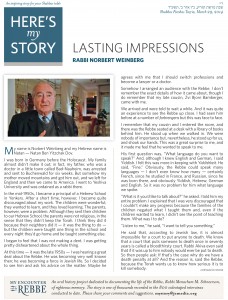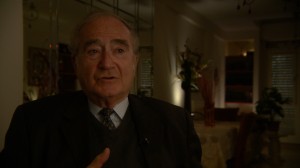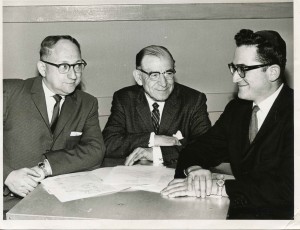HMS: Lasting Impressions
My name is Norbert Weinberg and my Hebrew name is Natan – Natan Ben Yitzchak Dov.
I was born in Germany before the Holocaust. My family almost didn’t make it out; in fact, my father, who was a doctor in a little town called Bad-Nauheim, was arrested and sent to Buchenwald for six weeks. But somehow my mother moved mountains and got him out, and we left for England and then we came to America. I went to Yeshiva University and was ordained as a rabbi there.
In the mid-1950s, I became a principal of a Hebrew School in Yonkers. After a short time, however, I became quite discouraged about my work. The children were wonderful; they wanted to learn, and they loved learning. The parents, however, were a problem. Although they sent their children to our Hebrew School, the parents were not religious, in the sense that they didn’t keep the Torah. I think they did it because their neighbors did it – it was the thing to do – but the children were taught one thing in the school but every night they’d go home and be taught something else.
I began to feel that I was not making a dent. I was getting pretty disheartened about the whole thing.
At this time – it was the late 1950s – I was hearing a great deal about the Rebbe. He was becoming very well known then; he was becoming a force in Jewish life. So I decided to see him and ask his advice on the matter. Maybe he agrees with me that I should switch professions and become a lawyer or a doctor.
Somehow I arranged an audience with the Rebbe. I don’t remember the exact details of how it came about, though I do remember that my late cousin, Bjorn Bamberger, came with me.
We arrived and were told to wait a while. And it was quite an experience to see the Rebbe up close. I had seen him before at a number of farbrengens but this was face to face.
I remember that my cousin and I entered the room, and there was the Rebbe seated at a desk with a library of books behind him. He stood up when we walked in. We were nobody of importance but, nevertheless, he stood up for us, and shook our hands. This was a great surprise to me, and it made me feel that he wanted to speak to me.
His first question was, “What language do you want to speak?” And, although I knew English and German, I said Yiddish. I felt this was more in keeping with Yiddishkeit. He said, “Fine.” Obviously, the Rebbe could speak many languages – I don’t even know how many – certainly French, since he studied in France, and Russian, since he was born there, and obviously Yiddish, Hebrew, German and English. So it was no problem for him what language we spoke.
“What is it you’d like to talk about?” he asked. I told him my entire problem. I explained that I was very discouraged that I couldn’t make any progress because the families of the children negated what I taught them and, even if the children wanted to learn, I didn’t see the point of teaching them. What was I to do?
“Listen to me,” he said, “I want to tell you something.”
He said that, according to Jewish law, it is almost impossible for a court to put anyone to death. We know that a court that puts someone to death once in seventy years is called a bloodthirsty court. Rabbi Akiva even said that if it was up to him nobody would ever be put to death. So then people ask: If that’s the case why do we have a death penalty at all? And the reason is, said the Rebbe, because the Torah wants us to know how serious it is to kill somebody.
The Rebbe continued, “Say a person is, in fact, sentenced to death. Can you imagine what kind of person this had to be for the court to hand down that sentence? He had to refuse to listen to the warning of two witnesses and murder someone in front of other people; he has no fear and no shame.
Now think about this: This murderer was sentenced to death by the court. If he now asks for a glass of water before the verdict is carried out, he has to make a blessing on that glass of water just like the greatest tzaddik in the world…”
I listened quietly, following the Rebbe’s train of thought, but not quite getting the point just yet.
“You are asking me,” he continued, “what importance it is to teach these children. These young kids are guiltless, they’re just starting out in life. Each of them could become the greatest people, the greatest of Jews. You’re asking me if it’s worthwhile to teach them?! Even a murderer on the way to execution would have to make a bracha the same way a tzaddik has to make a bracha. How, then can you deny this child the opportunity to recite a bracha? To teach a child to make a bracha – what can be greater?”
I was absolutely stunned. During all my time in education, such a perspective never, ever occurred to me.
Hid words sank in, and we spoke a bit about the practical implications of his approach.
As we were leaving, his final words of advice to me were: “Don’t worry about it – don’t worry about what they will or won’t do. You just try your best with them and their mitzvos will have strength of their own.”
We got up to leave, and he shook our hands. When we walked out, one of the secretaries asked me, “What did you speak about for so long?”
“What do you mean ‘so long’? We only spoke for a minute or two.”
“You were inside for almost forty-five minutes,” he told me.
When I was with the Rebbe, I hadn’t noticed the passage of time. I was totally taken aback when I heard that.
That audience with the Rebbe made a huge difference in my life, it gave me the strength to go on. When I realized that any mitzvah that I could plant in the children would have a force of its own, as the Rebbe had said, I knew that my effort would not be wasted.
A rabbi doesn’t have an easy life. As Moses put it, “A little longer and they will stone me!” It’s not an easy thing. And yet, it doesn’t matter anymore to me because I know that any mitzvah I can plant in them is going to have a force of its own and it’ll do what it has to do.
That’s the story of my encounter with the Rebbe. Thinking back about it now, it seems that it happened just yesterday. That was sixty years ago, but the passing of time doesn’t matter at all – that’s the kind of impression it made on me.
Rabbi Norbert Weinberg has worked as an educator and rabbi in various institutions in New York, Massachusetts and Connecticut. Presently he serves as rabbi of the Adams Street Shul in Newton, Massachusetts. He was interviewed in Israel in January, 2013.








No Comments to “HMS: Lasting Impressions”